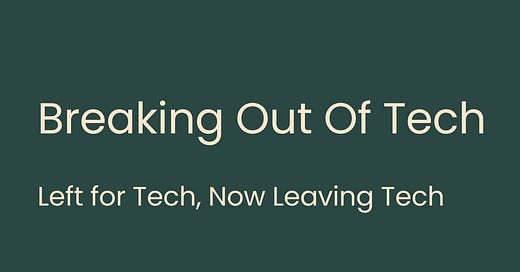We are Stella and Amy. We share firsthand stories at the crossroads of tech, business, and culture, helping leaders craft actionable cross-cultural strategies. Together, we bridge cultural divides and bring the world a little closer—one step at a time.
Before 2005, tech was nowhere near the shiny beacon of prestige and wealth it is today. Computer Science degrees were for the nerdiest nerds, while average nerds happily pursued traditional engineering careers. After graduation, they settled into roles within conventional industries, stably building their careers.
Then came 2010. Tech giants like Google, Facebook (now Meta), and Apple transformed the industry landscape with eye-popping salaries, generous stock options, and vibrant, flexible workplaces. We couldn't resist jumping ship, chasing the glamor of 2x or even 3x our previous salaries and the enviable Silicon Valley lifestyle.
Fast-forward to 2025, and the once-glittering tech world is starting to lose its shine. Waves of layoffs, economic uncertainty, and the rapid rise of AI coding assistants have shaken our sense of job security. A sobering realization has set in: this industry doesn’t truly value experience. Many of us are confronting a harsh new reality—wondering if we’ve become “too old” or “no longer essential” in a field obsessed with speed and novelty.
We are seriously thinking about leaving tech. Maybe you are too.
The tech industry is now witnessing an unprecedented mismatch in supply and demand. Companies are hiring less or hiring offshore to cut costs, and they expect AI coding to compensate for the productivity loss. Hundreds of tech candidates compete to get the same job.
Traditional Industries Need Talents
Meanwhile, in a parallel universe, there has been a growing demand for talent in traditional industries—manufacturing, agriculture, logistics, healthcare—which are desperately hunting for skilled professionals to guide them through digital transformation and AI integration.
To be clear, we're not talking about software startups that disrupted these sectors—think Uber or Airbnb. We're talking about the industries themselves: ones with modest margins, historically slow to adapt, but now increasingly eager for innovation to remain competitive. They might not even dare to think about digital transformation yet; they are struggling to fill other positions like operations and non-software engineering roles.
Ironically, these industries and struggling tech workers from tech companies seem largely disconnected. Ask a laid-off software engineer when the last time was that they applied to a traditional company. They probably have applied to 10 AI startups with no funding but none of the opportunities from traditional industries even crossed their mind.
True—traditional industries often pay significantly less than tech, which has historically been a huge deterrent for us. But with current turbulence shaking the tech sector and growing fears of becoming irrelevant, perhaps this is the time for us to genuinely explore alternative careers in traditional industries.
An Alternative Career
Joining a non-tech industry could be a surprisingly good move right now. With AI increasingly outperforming many developers at coding tasks, our real advantage as tech professionals (software engineers, product managers, data scientists) lies in our ability to deeply understand industries fundamental to the economy. Gaining domain expertise outside of tech might just be our next competitive edge.
The abundance of AI tools, coupled with global political and economic uncertainty, is reshaping how we think about a lasting career. It might just be the perfect moment to pivot back into these traditional industries—as a retreat, but also as a fresh start to learn new things and maybe repurpose our skills and insights.
Admittedly, traditional industries haven't always been attractive to us due to lower pay, rigid corporate structures, and slow technological adoption. But times are changing. Demographic shifts like declining birth rates, economic fluctuations, and policy unpredictability mean these sectors urgently need fresh thinking and faster adaptation of technology and automation.
If traditional industries want to attract the talent they desperately need—talent that, until recently, lived comfortably inside the tech bubble—they’ll need to adapt too. They can get creative with compensation (if high salaries aren’t feasible, try a mixed compensation with equity or profit-sharing) and outline a clear career growth path.
On the flip side, tech talent also needs to do some soul-searching. It’s time to step out of the comfort zone, dive deep into a new industry, and find ways to repurpose their skills in unfamiliar work environments.
Looking Ahead
This is just the beginning of a conversation we think is long overdue. We're diving deeper into the untapped world of traditional industries and the tech talent rediscovering purpose and opportunity there. If you’ve already made a leap into a new domain—or if your industry is undergoing a quiet, powerful transformation—we want to hear your story. Let's build a new narrative together, one that’s not just about disruption, but reinvention.
*Note: In this context, we're using Tech as shorthand for the software industry, excluding the hardware sector. It's worth noting that in Taiwan, the term tech industry typically refers to hardware tech companies, such as those in semiconductors and manufacturing.
If you are interested in working with us more closely, we offer AI strategy / business consulting service. Refer to [this article] to see why working with builder-strategists like us is different from traditional business consultants.
Email us at stellaxamy@gmail.com or
Become a member and meet with us monthly.





